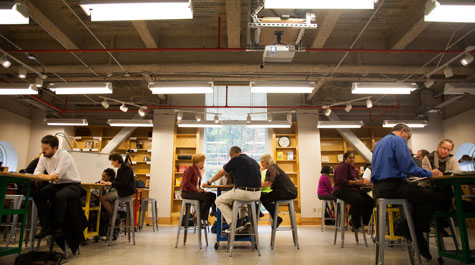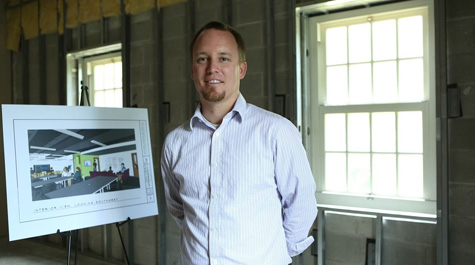Two faculty projects receive Creative Adaptation funding
Two projects designed to improve the quality, scope and/or efficiency of programs at William & Mary were made possible this semester with support from the provost’s Creative Adaptation Fund.
Established in November 2011, the fund was designed “to engage and unleash the creative energy in the academic areas to develop creative adaptations that improve the quality of our educational programs either directly or indirectly, by reducing costs or generating new revenues and thereby providing funds that can be reinvested in people and programs,” according to a campus message from Provost Michael R. Halleran.
In March, Halleran approved $70,050 in grant funds to the faculty-designed projects.
This year’s approved projects are:
Innovation Lab Summer Institute
Investigators: Mark Hofer, Lindy Johnson
Next summer, the School of Education’s new Center for Innovation in Learning Design will host a series of institutes and workshops for teachers and principals to come together and brainstorm innovative solutions to real-world classroom problems. The program, which was awarded $43,050, is designed to encourage and educate on ways to incorporate hands-on, project-based learning and design thinking in K-12 schools. Mark Hofer
Mark Hofer
“Teachers and principals have felt constrained and mired in this testing culture for years,” said Associate Professor Mark Hofer. “I think they are excited about the opportunity to change, but sometimes they just don’t know where to start.”
Drawing on their experience piloting a new student-centered curriculum in Williamsburg/James City County Schools, Hofer and Lindy Johnson, assistant professor of English education, proposed a week-long, small-group summer institute where attendees will have the chance to learn about new research involving project- and game-based learning. In addition, the session will provide teachers and principals with step-by-step guidance for implementing the ideas into their school’s current curriculum. Lindy Johnson
Lindy Johnson
“We can’t individually go out and reinvent every school, but we can bring principals and teachers together and really help them think about how they can do things more effectively in their classrooms,” said Johnson.
Hofer and Johnson said the educational materials developed for the institute will be useful in educating W&M’s undergraduate and graduate students on becoming innovative teachers. Additionally, the revenue generated from admission to the institute would go toward program initiatives within the Center for Innovation in Learning Design and graduate assistantships.
Hofer and Johnson will spend the next year researching, designing and developing the itinerary and materials for the program, which they expect to kick off in late June 2017. Long-term, they hope the lessons they learn through the institute will be shared beyond the Williamsburg community and the state of Virginia through national workshops or online repositories.
“If a school in Williamsburg is struggling to engage high school students more actively in their learning or create a schedule structure that is more in tune with adolescent needs, there are other schools around the country struggling with the same thing,” said Hofer. “I think schools can certainly learn a lot from each other.”
Entrepreneurial Ventures Redesign and Blended e-Learning Initiative
Investigators: Graham Henshaw, Ron Monark
The Alan B. Miller Entrepreneurship Center at the Raymond A. Mason School of Business was awarded $27,000 to expand its program offerings through revamping one of its courses, Entrepreneurial Ventures.
Executive Director Graham Henshaw and Managing Director Ron Monark will produce a series of online video modules that will allow students to consume the bulk of the course content online. Doing so will free up class time for more individual interaction and hands-on learning, enabling the center to introduce a speaker series, practitioner workshops and site visits to the class.Graham Henshaw
Graham Henshaw
“I was a part of growing the Richmond startup ecosystem over the last four years, so I would like to take students up to Richmond to visit venture capital firms, startup accelerators and entrepreneurial ventures,” Henshaw said. “So they can see it face-to-face, see the skills and the mindset in action and be inspired.”
Henshaw said the center has a new focus on entrepreneurial thinking as opposed to being heavily startup-centric.
“This is a set of skills and a mindset that is characteristic of entrepreneurs that we want to cultivate in our students,” Henshaw said. “It could manifest in a startup, but could also manifest in a lot of different things.”
The skills include opportunity discovery, failing wisely, improvisation and collaboration, while the mindset fosters openness to risk, tolerance for ambiguity, grit and self-direction, Henshaw said.
Once the content has been developed, he said, it could be repurposed in workshop or boot camp form to be taught to students and professionals not otherwise associated with the business school. The grant proposal suggests that up to $20,000 of the grant funds could be recouped through non-traditional uses of the class material.
“These funds will help us create this content, which will be leveraged many times over in different settings,” Henshaw said. “The funds actually have a multiplier effect. We’re able to build an asset that has lasting value.”

